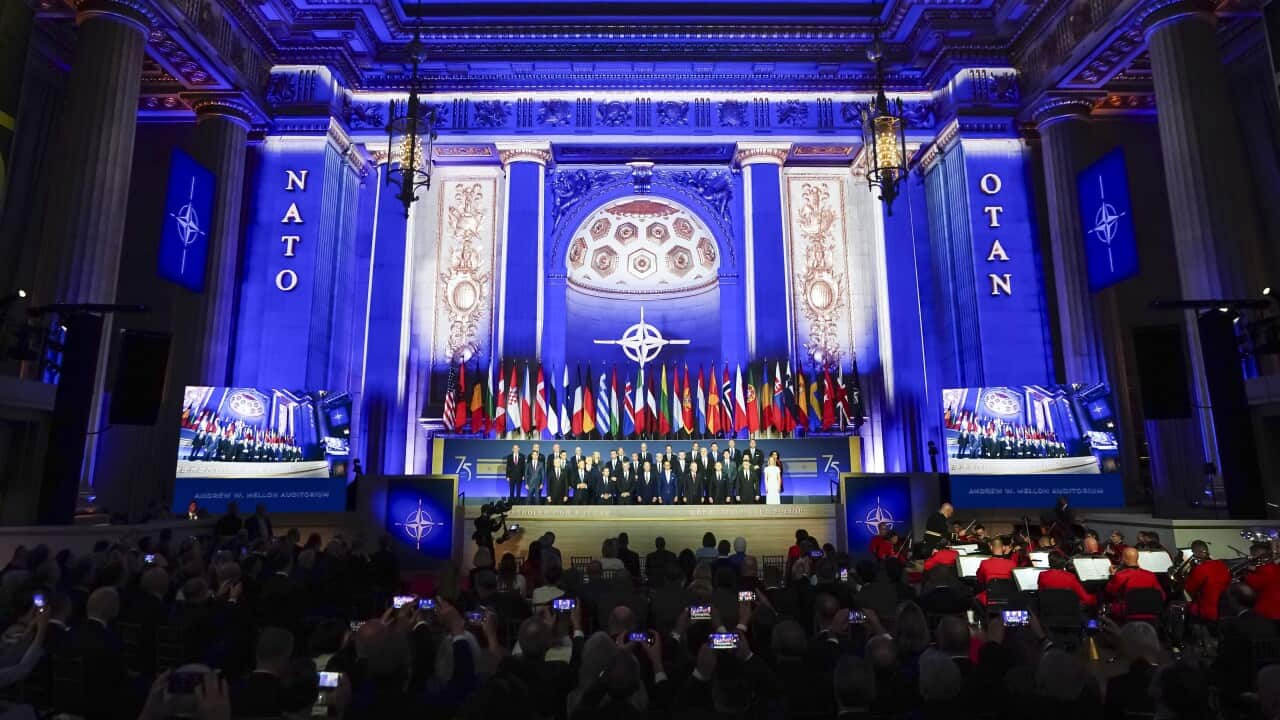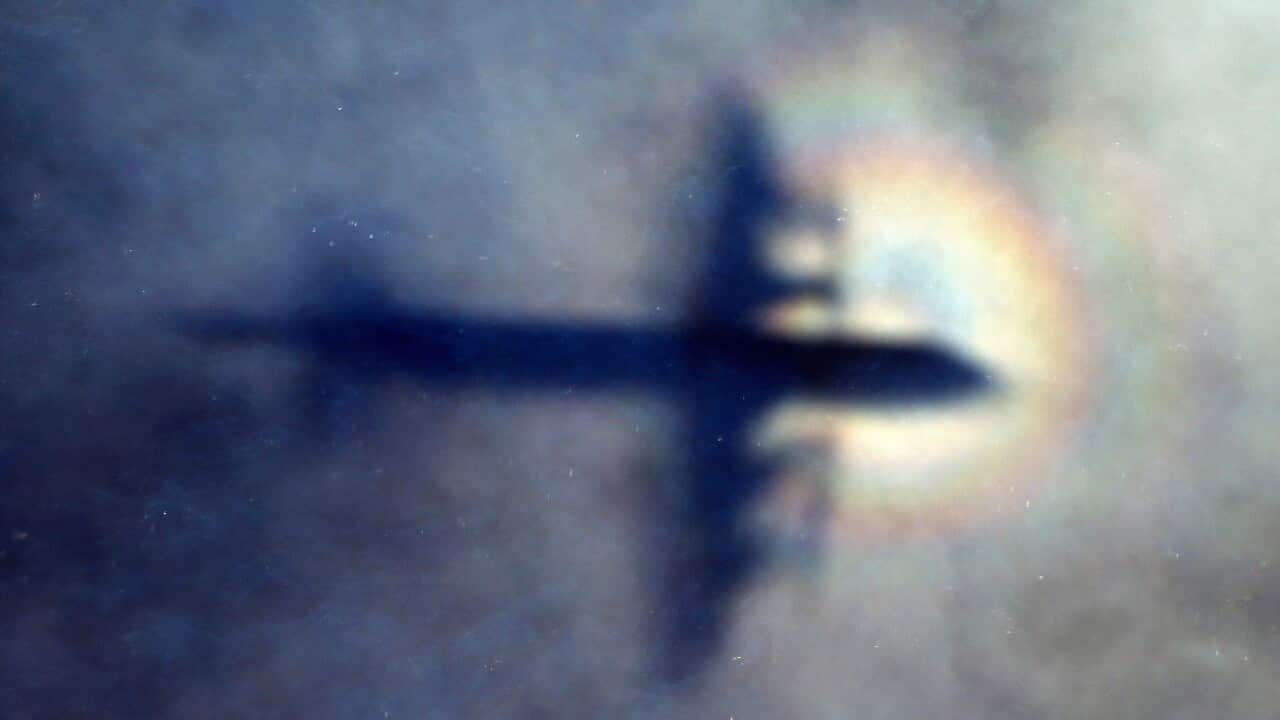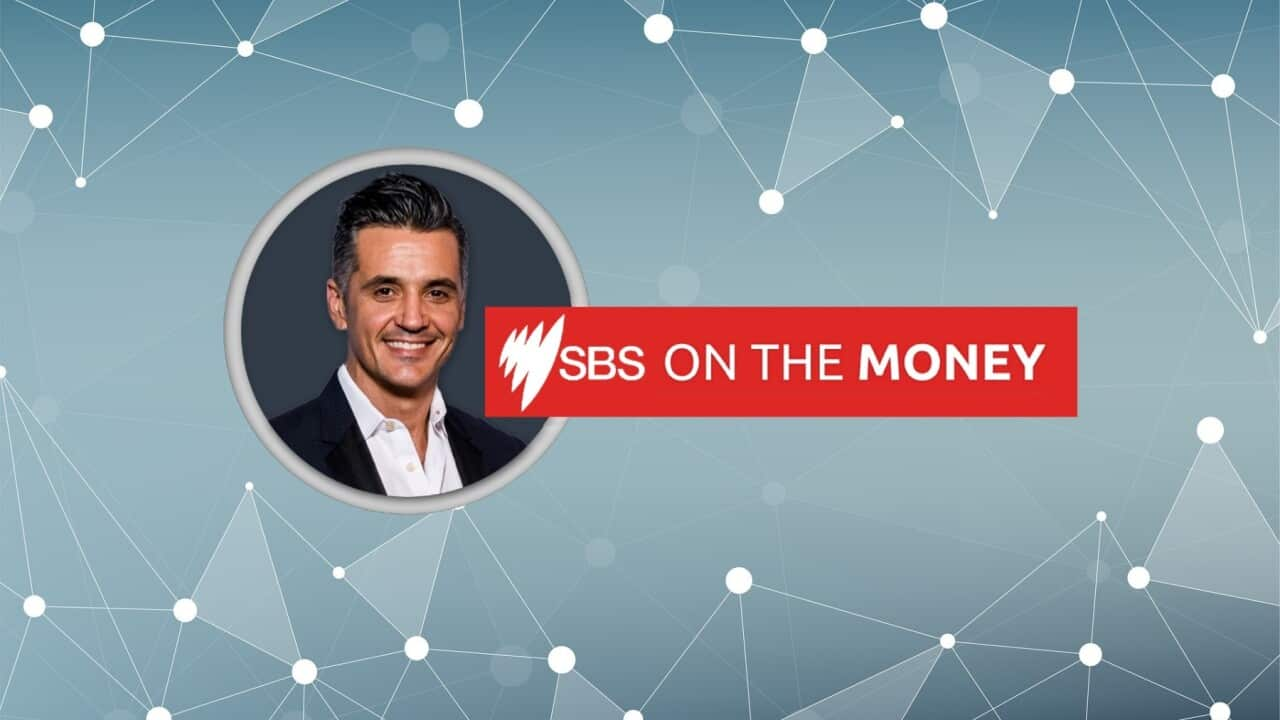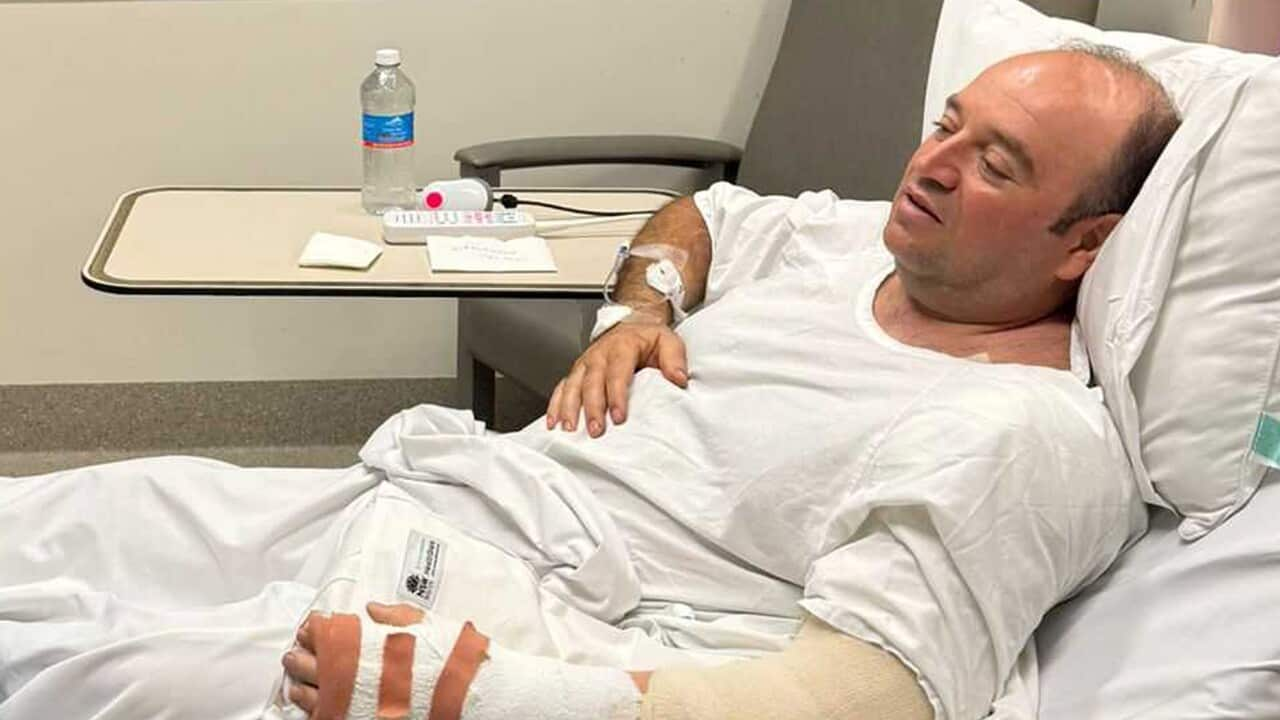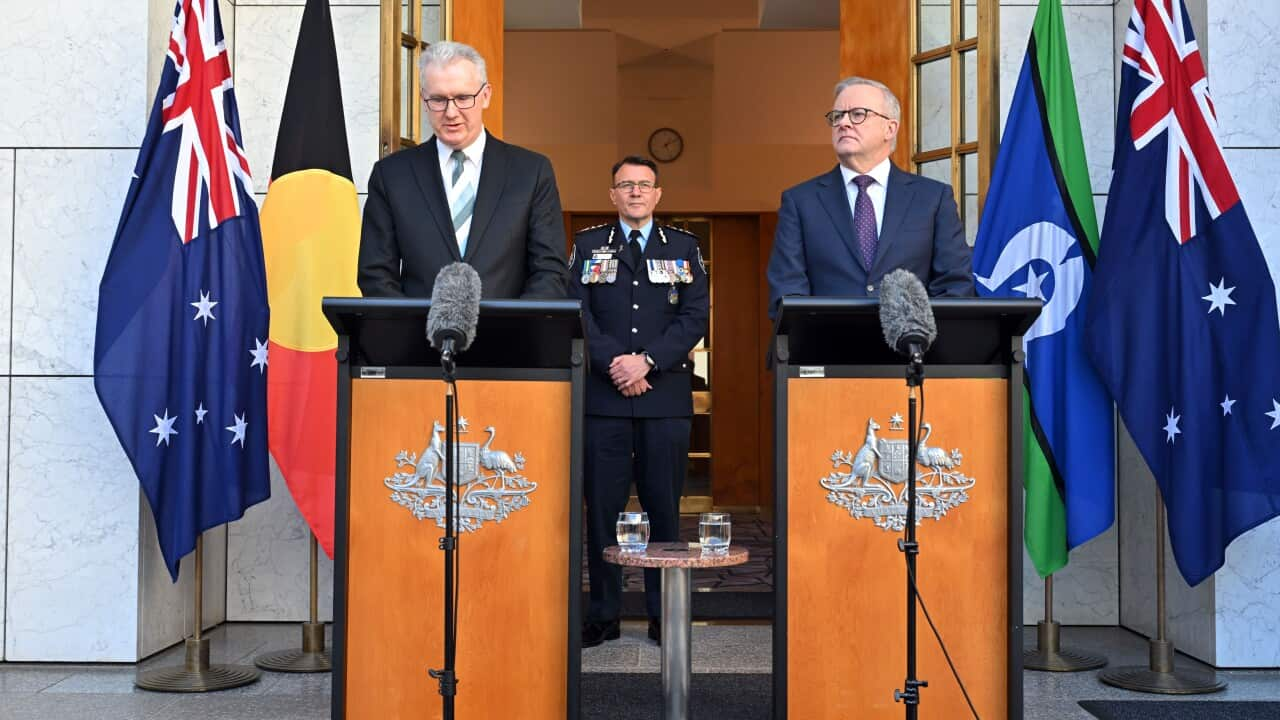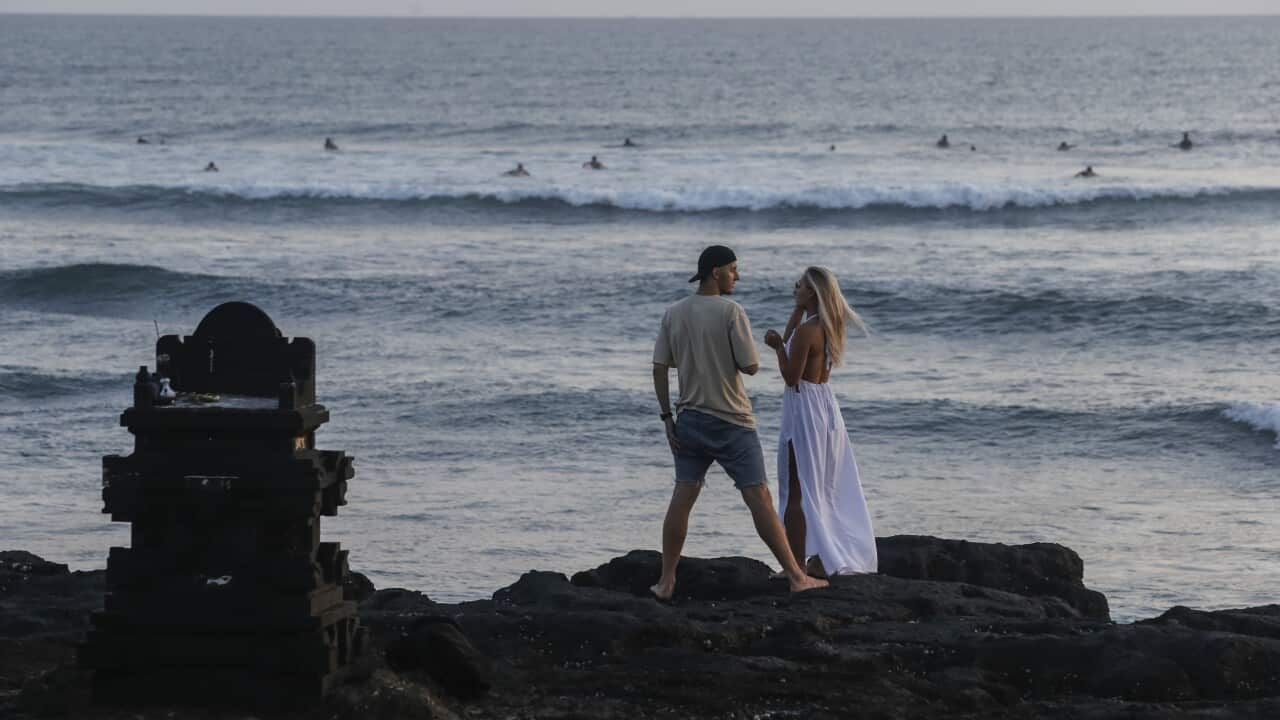TRANSCRIPT
The Washington Summit is underway with members of the North Atlantic Treaty Organisation celebrating the 75th anniversary of the alliance. SBS takes a look back at NATO’s creation and rise over the past seven and a half decades.
The Washington Summit is underway with members of the North Atlantic Treaty Organisation celebrating the 75th anniversary of the alliance.
What sparked NATO’s creation and rise over the past seven and a half decades?
It all started on the 4th of April, 1949 - and the aftermath of the Second World War.
"Archival recording:The world's attention centres on Washington as in the state auditorium, representatives of 12 nations of Western Europe and North America assembled for the signing of the North Atlantic Treaty."
In that year - twelve founding nations from Europe and North America, sign what is known as the North Atlantic or Washington Treaty.
As then-United States president Harry Truman explained - it was an attempt to provide collective security against Soviet expansionism, stop the revival of nationalist militarism, and encourage European integration.
"To consult together whenever the territory or independence of any of them is threatened. And to come to the aid of any one of them who may be attacked.”
In 1951 NATO held its first military exercises, and a year later welcomed Greece and Turkiye as members; West Germany followed in 1955.
In response a number of Central and Eastern European Communist states created the Warsaw Pact.
This marked a European standoff, which lasted until late-1990 when a joint non-aggression declaration was signed, months before the Pact was finally disbanded in 1991.
At the time, Mikhail Gorbachev was President of the Soviet Union.
"By constantly cooperating in all affairs related to shaping of the new type of the world politics, to moving towards the new peaceful period of history, we fulfil our duty to other nations as well."
Among NATO missions, was the deployment of peacekeepers in Bosnia-Herzegovina after the country was savaged by a bitter war in the early 1990s.
The war involved a number of countries from what was then known as Yugoslavia.
At the time, Javier Solana had just been appointed NATO's Secretary-General.
"Four days ago following adoption of the UN Security Council resolution 1031. NATO initiated operation Joint Endeavour to establish a NATO- led implementation force for the Bosnian peace agreement. Today at 11 o'clock Admiral Leighton Smith, as commander of IFOR and assume control of military operations in Bosnia Herzegovina."
Four years later, airstrikes against Yugoslavia halted their assault in an unfolding humanitarian catastrophe in Kosovo.
This marked the first time force was used against a sovereign state without UN approval.
NATO has been leading the peacekeeping support operation in Kosovo under a UN mandate ever since.
At NATO's core, is the principle of ‘collective defence’, meaning an attack against one ally is considered as an attack against all allies.
The notion is enshrined in Article Five of the treaty, ensuring all members will come to the defence of those attacked.
Article Five been invoked only once, following the September 11 terror attacks, by then NATO Secretary-General George Robertson.
"The council agreed that if it is determined that this attack was directed from abroad against the United States it shall be regarded as an action covered by Article 5 of the Washington Treaty."
In 2003, NATO took control of the International Security Assistance Force in Afghanistan.
It launched a mission to train Afghan forces in 2015 which remained in place until the Allied troop withdrawal and Taliban take over in 2021.
February 2022 marked another turning point for NATO following Russia’s invasion of Ukraine.
Jens Stoltenberg was at the time, and continues to be NATO's Secretary General.
"The suffering we now see in Ukraine is horrific. It affects us all and we have a responsibility to ensure the conflict does not escalate and spread beyond Ukraine."
Following Russia's invasion of Ukraine, Finland and Sweden launched bids to join NATO.
That took the number of NATO members from 30 to 32.
Three NATO partner countries have also declared their accession aspirations, Bosnia and Herzegovina, Georgia and Ukraine.
The latter’s so called ‘bridge to membership’ is a key discussion point in Washington this week.
US President Joe Biden opened the NATO Summit, touting the bloc's achievements, reflecting on its 75 years of history.
And he had some news for Russia.
"Today I'm announcing a historic donation of air defence equipment for Ukraine. The United States, Germany, the Netherlands, Romania and Italy will provide Ukraine with the equipment for five additional strategic air defence systems. And in the coming months, the United States and our partners intend to provide Ukraine with dozens of additional tactical air defence systems. The United States will make sure that when we export critical air defence interceptors, Ukraine goes to the front of the line."
Australia's defence minister Richard Marles is also at the NATO summit.
He is set to announce the next tranche of support for Ukraine during the summit where he is meeting with counterparts to discuss Russia's invasion and security in the Indo-Pacific.
"Ukraine being able to resolve this conflict on its terms is in Australia's national interest, that's why we've provided significant support to Ukraine up until this moment of time, and we'll continue to provide support to Ukraine. we see this as a conflict that is likely to endure over a period of time, and we certainly will be standing with Ukraine, for as long as it takes for Ukraine to resolve this on its own terms. It really matters that countries around the world, and obviously, this will be a big topic at NATO this week. It really matters, that those countries continue to support Ukraine, that we see the leadership of NATO, in that respect."
Mr Marles says the world currently faces many challenges.
"We face challenges around the world. The global rules based order is under as much pressure now as it's been really at any point since the end of the Second World War. And that is the thing that is on the front centre of people's thinking certainly, from Australia's point of view, at this meeting that supports from the centrei and our thinking and we are looking forward to the opportunity to engaging with NATO in this moment. But that is driven by the complexities and the challenges that we're finding in the world today."
NATO Secretary-General Jens Stoltenberg says Russia must not be allowed to win its war against Ukraine at any cost.
"Our support comes with costs and risks. The reality is there are no cost free options with an aggressive Russia as a neighbour. There are no risk free options in a war. And remember, the biggest cost and the greatest risk will be if Russia wins in Ukraine. We cannot let that happen. ... The outcome of this war will shape global security for decades to come. The time to stand for freedom and democracy is now. The place is Ukraine."
Russian President Vladimir Putin was critical of comments made during the summit's first day, accusing the alliance of escalating tensions and destabilising global security.
He reiterated that NATO's expansion and support for Ukraine are direct threats to his country, saying Russia is ready to defend its interests.
